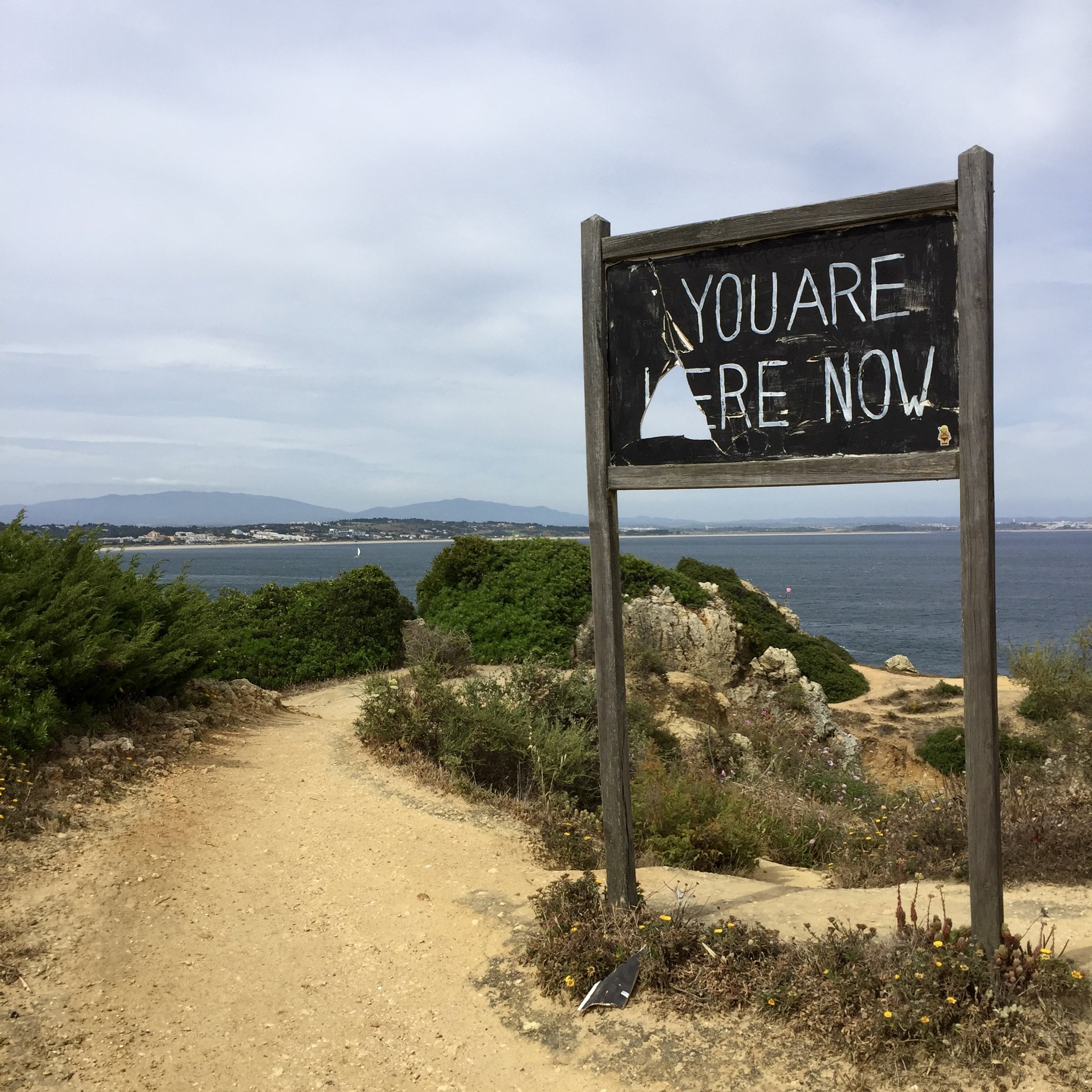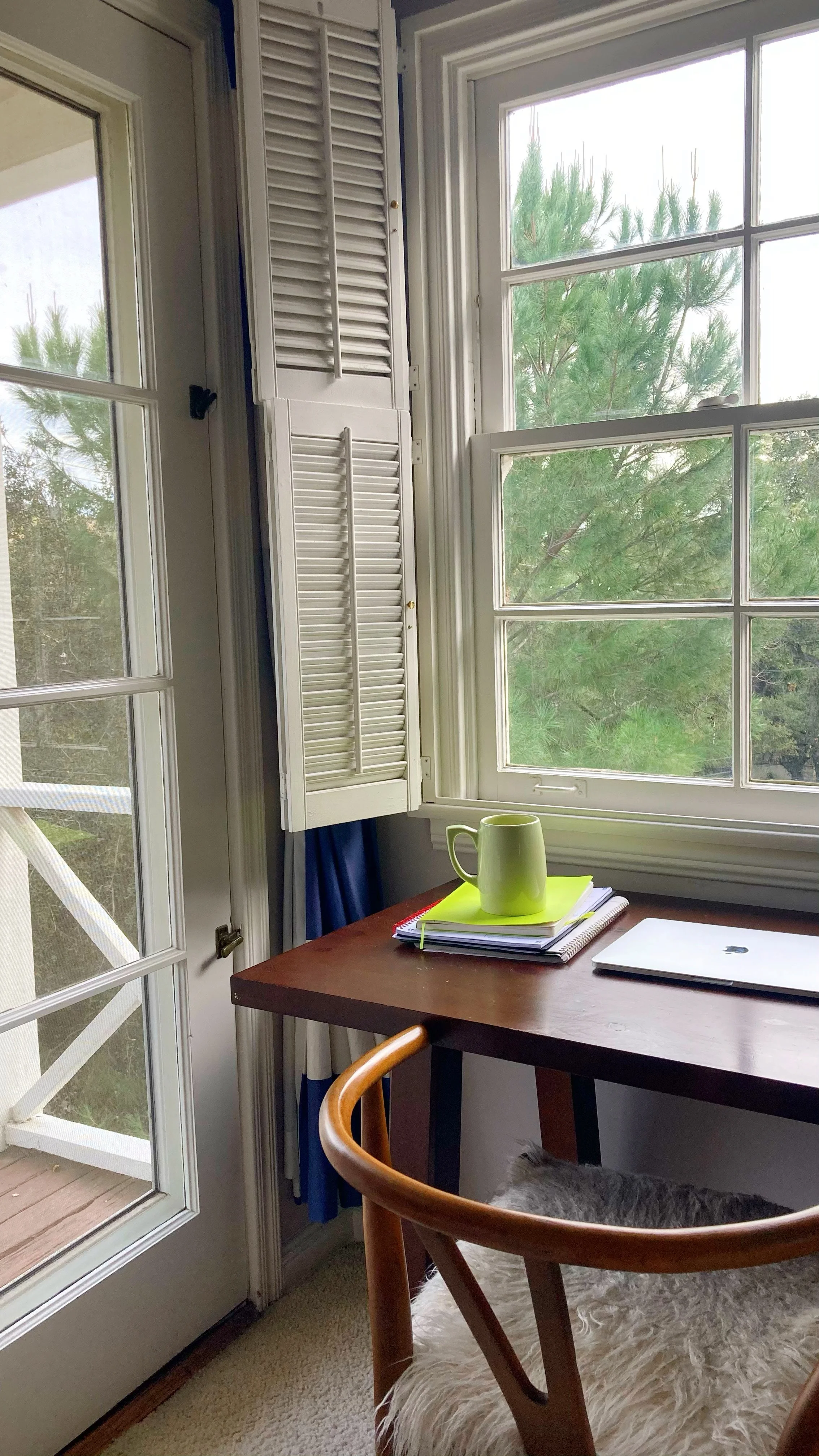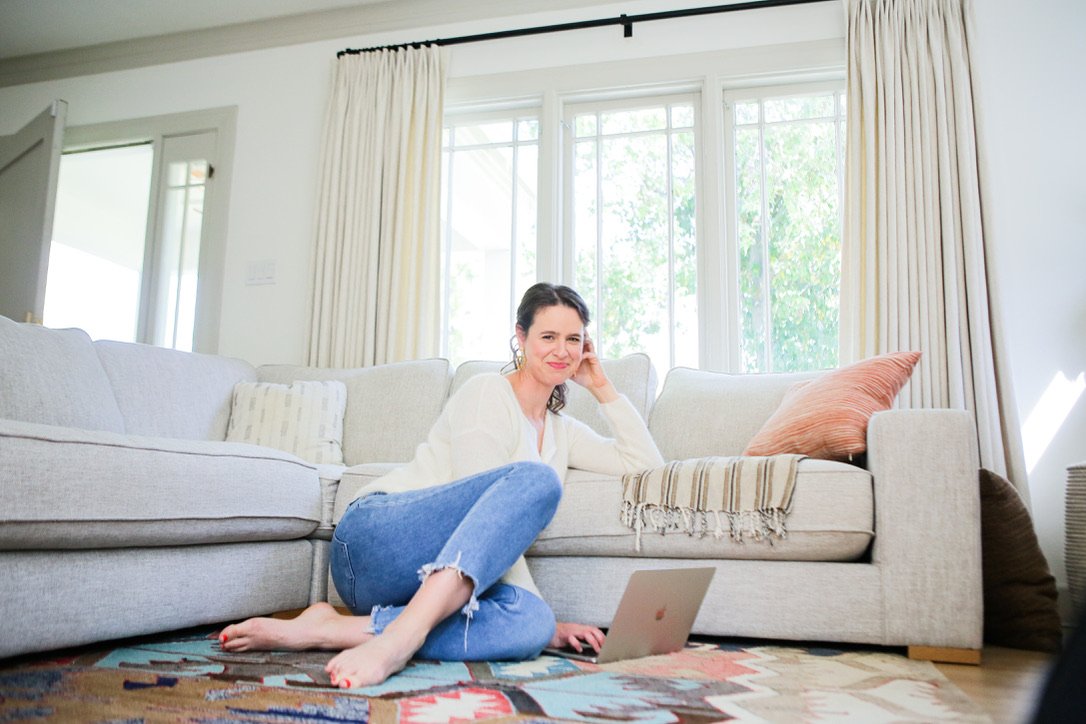Blog
Two reminders about decision-making
Some time ago, I got an email from a recent college grad.
She was deciding between a prestigious yet challenging job in consulting (which she wasn’t that passionate about), or turning down the position to find something that would be more fulfilling + have better work-life balance.
Given my background, she wondered if I had ideas for her.
I offered her a few ideas then – and have thought about her since, as many of my 1:1 clients encounter similarly difficult decisions.
So I thought I’d share two reminders about decision-making that are relevant to her — and perhaps also to you:
No matter what decision you make, you will likely be dissatisfied.
We all want to believe that if only we can get “clear” – we’ll see that sparkly, “hell-yes” option right in front of us. But in fact, we are often choosing between two (or more) options with serious downsides.
For this recent grad: The consulting job was exhausting + not-that-fulfilling. But turning it down was a serious loss of income, prestige…and what, exactly, was she going to do instead? Would it actually be better?
This reality also applies, even if you are deciding between two choices you like - two “yeses.” I have a 1:1 client right now, who is deciding between a bunch of future career choices – many of which he quite likes! And yet, he may also be dissatisfied, once he finally choses one.
(This is counter-intuitive! We often assume that if we have two or more great choices, we should be happy either way. While that does sometimes happen, at other times, we are still dissatisfied either way, because we know we’re giving up at least one – and sometimes several — wonderful opportunities, by choosing just one.)You’re gonna have to “sift.”
The right decision may never be significantly more “right” than the others.
It may be more about “sifting” through things with similar levels of rightness… until you find the one that is just subtly, very slightly, better.
In other words: if Option A is 40% right, Option B is 40.5% right, and Option C is 41% right… man, that’s a hard decision. You’re going to have to sift very, very carefully.
I have a client who is doing this, right now, as he makes a very challenging decision about his career next steps + starting a business. (And in order to do that “sifting through” work, he’s doing a ton of this.)
…
I hope that these reminders bring you strength and encouragement. I think that sometimes we face tricky decisions and berate ourselves for our lack of clarity.
But sometimes, we assume “clarity” means one, obvious “hell yes”… that doesn’t actually exist here.
(But, of course, there are a lot of things that can help with the clarity process with imperfect choices – I’d highly recommend hiring me, if that’s a journey you’re on right now.)
And as always, I’m rooting for you — as you “sift” to find your most right decisions.
Katie
p.s. This is a nice time of year to start coaching — what a gift to yourself, to use the back-to-school energy to re-connect to yourself and your values. Learn more about working with me here.
p.p.s. And above all: maybe what’s possible for you is more than you dare to hope for.
Sign up for my newsletter to get helpful + encouraging essays like this every Sunday morning. It’s free!
The medicine works if you take it
Here’s something I’ve been telling a few clients lately:
The medicine works, if you take it.
Here I’m talking about whatever it is, that helps you feel the way you want to feel:
Less stressed
Happier
Calmer
More energized
More focused
Clearer
Sharper
While many of us could use some new ideas or fresh perspectives, we also typically have at least one idea of something that would help us to feel the way we want to feel.
We’re just… not yet doing it.
And look — I will be the first person to raise my hand and say…there have been many times when I didn’t have the capacity to do the things that would serve me. This essay is 0% intended to make you feel guilty.
But I have also observed that it can be times when it is incredibly empowering to have someone who really, really cares about you look you in the eye and say:
Hey, you don’t *have* to do this thing. Zero pressure. But also… if you want to feel better, you know what the medicine is. You can take it anytime.
So let this email be me — softly, gently, with compassion and love oozing out of my pores — reminding you:
Hey friend. The medicine does work, if you take it. Would you consider taking it?
…
As always, I’m rooting for you. You’ve got this.
Katie
p.s. I specialize in working with people who are already pretty “together” in their lives — paying their bills, meeting their commitments. But just because your life looks pretty good on paper, doesn’t necessarily mean that it feels right to you, from the inside out.
If you're interested, learn more here.
Want to receive essays like this every Sunday morning? Sign up for my newsletter!
"I only know what I don't want" (or: "no"-only compasses) - Part III
I’m starting this year by sharing some core concepts that I find most helpful to my clients — our compass + our engine. My last few essays have been about our compasses (here, here, and here) – and I wanted to share a final more core concept about compasses this week.
…
One final compass insight for you:
Some people’s compasses — either for a period of time, or for always — only tell them what not to do. Don’t take this job, don’t get married to this person. But it never actually tells them what *to* do.
In other words: “No”-only compasses exist.
The good news is that even though this is annoying, you actually can navigate through life with this just fine. It will work, and will work quite effectively — even with “no”-only signals.
But you have to kind of get used to that process, too, and learn how to work with the compass you have — which, again, is not Google Maps.
…
As always, I’m rooting for you in the week ahead. You’ve got this.
Katie
p.s. If you’d like to do a total overhaul on your compass and/or engine this year, I highly recommend working with me 1:1. Here’s what one client said about her experiences working with me:
“{…}It was truly life-changing. In a very short time, Katie was able to truly see me, probably better than anyone ever has, and more importantly she helped me be able to see myself - which I realized I had never actually done before. She really has a knack for reading the moment and knowing what is needed in that moment, while also knowing how that moment relates to the bigger picture.
I can't recommend Katie enough.”
— Celia
Want to receive essays like this every Sunday morning? Sign up for my newsletter!
Compasses are kind of like iPhones (Your Compass, Part II)
I’m starting this year by sharing some core concepts that I find most helpful to my clients — our compass + our engine. I’m starting with our compasses (here’s last week’s) – and I wanted to share another idea this week.
…
Today I wanted to share #1 misunderstanding about compasses that I find I have to explain to the world.
Here it is:
Compasses drained of batteries will only tell you that they are drained of batteries.
You know how when your iphone or your laptop is drained of battery, you can turn it on, it just shows the “battery is dead” sign, and then turns itself off?
The compass is 100% like this.
If human (metaphorical) compasses came with instruction manuals, they would say: Compass will not give directional information when drained of battery.
Often, when people get that battery-dead-turning-itself-off thing, they freak out and think their compass doesn’t work. When actually, your compass is totally working.
It is just telling you the one thing it really, really wants you to know, which is “you are tired.”
…
And this is, truly the #1 misunderstanding about compasses that I find I have to explain to the world. I tell it to clients very frequently. I told this to a friend just this week.
My friend was feeling stressed out + scared because she didn’t know what she wanted to do professionally. I asked her what she wanted to do, and she said:
You know, I just think if I was being honest, I don’t want a job at all. I’d love to never work again. But I can’t do that, financially, so I just feel trapped and like I have nothing to navigate by.
And it was very clear to me what the problem was.
So I told her: “Girl, your compass is working just fine. It’s just that when your compass is out of batteries, the only thing it’s going to tell you is to recharge the batteries. You’re not going to get any more information until there’s more juice in that thing.”
And then she laughed and was really relieved.
Because, she had been going through a busier time than usual, and she was genuinely tired. And she could quit her job to rest, of course, but she also could just prioritize rest more in her life as a whole, while keeping her job. Both are options.
…
But again, in these situations, the compass is working, it’s just doing what it is supposed to do, which is not to give a reading when it doesn’t have enough battery level.
So as my PSA for this month, please remember: Compasses drained of batteries will only tell you that they are drained of batteries.
…
As always, I’m rooting for you. You’ve got this.
Katie
P.s. Want to rebuild your compass? I highly recommend working with me 1:1. Learn more here about what it’s like to work with me, what past clients have said, and more.
Want to receive essays like this every Sunday morning? Sign up for my newsletter!
How to reconnect with your inner compass (Part I)
Remember how I said I wanted to talk about your compass + your engine this month? I thought we could start with the compass — that part of you that tells you what direction to go in life (since your engine isn’t that useful, if you don’t know what direction to go.)
So here’s one reminder:
The more you do use your compass, the easier it is to use.
Your compass — which we could also call your authentic truth, your knowing, your sense of “right”-ness — is like a muscle. The more you use it, the easier it is to use.
Ask a professional ballerina to lift her leg above her head – and she can do it immediately, and with ease.
Ask me to do it, and I can’t. I’ve spent almost no time building that muscle – it’s not strong enough, and the connection between me and my leg isn’t strong enough.
The more often you get in touch with your truest desires — about anything, including what you want to eat for dinner, whether you like that water bottle, or how you actually feel about your office mate — the easier those desires will be to hear about the more complex, thorny, subtle parts of life.
And the opposite is also true. The less you listen to your sense of truth, or authenticity, or right-ness, or whatever you want to call it — the harder it will be to hear.
…
Part of my job as a coach is to give my clients exercises to build their own know-your-true-desires muscles.
If you’re interested in doing a little muscle-building this month (a fascinating exercise to do especially around the holidays), here is one of the most common versions I give to my clients:
Strengthening your ability to listen to your yeses and no’s
Typically, I will just focus on either yeses or no’s – so pick one. For whichever one you choose:
Start by remembering what it is to feel a “yes” or a “no.”
Think of at least one time in your past when you felt a visceral, full-body yes or no –an 8 or a 9 on a 10-point scale.
Maybe it was walking into the house you eventually bought (a “yes!”), or when you dragged yourself to your job that you hated (a “no”)! Maybe it was the last time you went out with that boyfriend, when every part of you knew it was over (a “no”) — or when you realized you loved your wife (a “yes”).
The point is to re-remember what that physical sensation was like, so you can recognize it for step #2.For the next week, track your yeses or no’s.
Keep a running list, for the next 7 days, of every single yes (or no) you feel, plus some small notes about what the physical sensation in your body was like (“I felt a closing in my chest,” “my belly felt tight,” “my back felt expansive.”)
Many of these will be silly, trivial yeses or no’s. You might feel a yes (or no) about what shoes you’ll wear, about bedtime with your kids, about cleaning up your office.
But they are important – they are strengthening the muscle of listening, so you have it when you most need it.
…
I’m just going to say it again:
Your connection with yourself — with your authentic truth, your knowing, your sense of “right”-ness — is like a muscle. The more you use it, the easier it is to use.
Happy Know-Your-True-Desires Month, everyone ☺
As always, I’m rooting for you in the week ahead. You’ve got this.
Katie
p.s. Would you like to work with me 1:1? Here's what one past client said about her experience:
“I feel like I'm a lighter, happier version of myself and a better partner, friend, and coworker than I was a year ago (my boyfriend outwardly agrees to anyone I say that to).”
Learn more here.
Want to receive essays like this every Sunday morning? Sign up for my newsletter!
Back to the basics: Your engine + your compass
I’m not a big New Years Resolution-type. It never made sense to me to set splashy goals in a season when I typically just need a good veg on the couch.
Instead, this January, I thought it could be fun to return to some of my core concepts — the things I tell clients day-in, day-out. The basics we all need.
For today: Let’s talk about the two things you absolutely cannot do without, to have a life that works for you:
An engine
A compass
A compass is what tells you what direction to go in. And an engine is what actually takes you there.
You need both.
If you have an engine but no compass, you can be driving around all day (or all decade), but it never quite feels like where you truly want to be.
If you have a compass but no engine, you know what you want but cannot freaking make progress towards it.
Typically, if someone finds their way to me, they’ve got an issue with one or both.
(If it’s both, I tend to treat the compass first, because there’s no use in having a functioning engine if you exhaust the car driving in random directions).
In the next few weeks, I’ll give a couple of ideas on helping you with both your Compass + your engine, but two questions + two ideas to start us off right this new year:
Question: Which of these do you tend to rely on more? Your compass, or your engine?
Idea: It could be an interesting experiment, this January, to let yourself give your dominant mode a rest, and let the other take the wheel for a bit. Compass-dominant people might have a really powerful month of checking in with themselves less, and powering forward. Engine-dominant people might have their minds blown if they slow down for a bit and really get directionality right.Question: Is any of these completely broken and needs to be taken to the mechanic to be repaired, or completely revamped?
Idea: If so, what would your “mechanic” be? A game-changing book? A podcast? A conversation with an insightful friend? A therapist or a coach? Here’s more about working with me, if you’d like.
…
As always, I’m rooting for you in the week (and year) ahead. You’ve got this.
Katie
p.s. Ready to work on both your compass and engine in 2024? I’d highly recommend working with me 1:1. Learn more here.
Want to receive essays like this every Sunday morning? Sign up for my newsletter!
People who are good at everything + their common problems
Some percentage of people who work with me are what I call “People Who Are Good at Everything.”
People Who Are Good at Everything are not good at absolutely everything. But they are often excellent in at least a few of the following ways:
Their bosses love them
They get great feedback at work
They are skilled in sports and/or the arts
They were excellent students
They are charming and charismatic with new acquaintances
Many people want to date them
Of course, there are clear advantages to being someone who is Good at Everything.
And yet, I have also noticed as a coach, that some (though not all) People Who Are Good at Everything develop a common problem.
It’s this: They forget how to know what they want.
…
We might assume that People Who Are Good at Everything would be excellent at knowing what they want. After all, they have so many amazing options to choose from — whether that be jobs, girlfriends, or colleges.
And yet, I have observed that some People Who Are Good at Everything can become quite disconnected from what they want, for at least three reasons:
They become addicted to being appreciated and adored.
Several of my clients who are Good at Everything have excelled at jobs that they didn’t particularly like anymore. It was hard to leave, because they were getting such great feedback from their bosses and colleagues and clients. Everyone adored them! They were killing it!
I’ve also witnessed someone who was very good at getting boyfriends to adore her, who stayed for months and sometimes years in relationships in which she didn’t adore the boyfriend. It felt so good to be adored!
Of course, positive feedback is important. But also, we can become over-reliant on it, to the point that we value them-liking-us so much, we forget about the importance of whether we like them.They are particularly susceptible to valuing impressiveness over their personal truth.
This is not to say that the impressive choice is never the right choice – sometimes it is! But for some People Who Are Good at Everything, their default becomes to just pick the impressive choice — because it is elite, because other people want it, because they can.
When we, over and over, default to picking the impressive choice without deeply inquiring about whether it is authentically right for us — our ability to even know what we want can atrophy…because we’re not using it.They can be unaccustomed to the discomfort of going after something that they want.
Sometimes, People Who Are Good at Everything can get accustomed to things coming easily. They are used to a lot of positive feedback, and a lot of great options.
But what they authentically want might require seeking out something that is not currently choosing them — they might have to go out there and get that job, relationship, or opportunity. They might face uncertainty on that journey, and come up against rejection and failure many times. This — to put it mildly — can totally suck.
For people who are not Good at Everything, well, this is just how life is — you gotta go after what you choose, things often don’t choose you.
But People Who Are Good at Everything sometimes lack those calluses, those muscles. They sometimes think that if something isn’t choosing them right now…it’s not meant for them.
But that isn’t necessarily true. It can just be that going after what you want can be really tough.
…
I wanted to share this concept because I suspect that many of you reading this are also People Who Are Good at Everything.
You don’t have to be a supermodel or a Heisman Trophy winner to be someone who is Good at Everything. You could be like this in only your professional life, or only your romantic life, or only in your friendships.
It has been empowering for my clients to hear that there are a specific set of problems that sometimes come along with being this type of person.
And, of course, while solutions are always deeply personal, there are also some common themes:
Re-remember how to know what you want, and how to be with the discomfort of the journey. Make sure your compass and engine are strong.
Reach out for help and support if you need it – I’d highly recommend working with me 1:1, if you’re feeling intrigued.
As always, I’m rooting for you. You’ve got this.
Katie
p.s. One of my clients who recently finished working with me wrote:
""These are lessons that I could potentially have learned ""on my own"" after another 1-2 decades of life experience, but the fact I have made such progress in 12 months means that working with Katie has easily been the best investment I've made in myself in my adulthood.""
I feel so moved by her saying that. If you'd like to work with me — I currently have two openings for new clients — learn more + reach out here.
Want to receive essays like this every Sunday morning? Sign up for my newsletter!
My parenting role model
Back in 2019, I read my favorite parenting “advice” essay of all time.
I was not a parent.
I was not even pregnant.
And yet, it inspired me as a human being. And now that I’m a parent, it inspires me even more.
The essay was called “My Mom was a Fast Food Cook”, and it was written by Mindy Berry Walker, who is now a mom with kids of her own, about her childhood in the 1970’s.
Walker’s mom, Mrs. Berry, was a full-time teacher, with three kids, who also played tennis nearly every afternoon after teaching.
Just let that sink in — especially if you’re a parent.
Full-time teacher.
Three kids.
Tennis every afternoon.
How did she do it? Well, in Walker’s words, “it probably helped that she didn’t have to rush home to prep dinner.” The family ate fast food most nights.
Chinese food, Italian, burgers – in their small town 70 miles south of St. Louis, there weren’t even that many options in the late 1970’s. It was a huge upgrade when a Taco Bell came to town and they could get Mexi-Melts.
Here’s what Walker said:
“I didn’t think much about my childhood dinner routine until about a year ago when I was out with fellow over-worked, over-stretched friends, and we were discussing the impossibility of finding time to exercise.
“I mentioned that my mom had played tennis nearly every afternoon after teaching when I was growing up. “How did she squeeze it in?” they asked.
“I explained it probably helped that she didn’t have to rush home to prep dinner. Brows furrowed in question. But the audible gasps didn’t come until I said, “And she never felt guilty about her choice! I never heard my mom say, ‘What’s wrong with me? I should cook more.’”
Oh man, I feel relaxed and frankly, delighted, whenever I hear that story.
Walker says that she’d like to think not cooking dinner was some fabulous form of 1970’s feminist protest, but ultimately, she thinks that her mom just didn’t like to cook. “She didn’t find it relaxing or rewarding to “have something in the oven.” Her own mother didn’t get satisfaction from making meals, and she didn’t encourage my mom, or any of us, to take it up.”
And, in fact: “Once she decided that she could be a good mom—the best mom, I’d venture—without being on stovetop duty every night, and that she and my dad were okay with the cost, the routine was set.”
Personally, I think of Mrs. Berry often. I love that she knew her priorities — fun exercise trumped cooking — and she freaking followed them.
…
So, today, I thought I’d share it with you:
In what area of your life could you be better (a better parent, employee, friend, spouse) — by letting yourself follow your truest priorities, and not feel guilty?
What about your life could you ask: What would Mrs. Berry do?
…
As always, I’m rooting for you in the week ahead. You’ve got this.
Katie
p.s. For some of you, there’s a big, ahem, holiday tomorrow. What do you think Mrs. Berry would do about that day?
p.p.s. Would you like to work with me 1:1 in the new year? Here's what one past client said about her experience:
“I feel like I'm a lighter, happier version of myself and a better partner, friend, and coworker than I was a year ago (my boyfriend outwardly agrees to anyone I say that to).”
Learn more here.
Want to receive essays like this every Sunday morning? Sign up for my newsletter!
One thing that often holds my clients back from making decisions
Remember how we talked about confusion last week? I wanted to add a quick additional note (something I tell clients all the time):
Sometimes the reason we are mired in the Land of Confusion is because we are not yet ready to take action.
If we took action…
We might have to find a new job.
Have a really dicey conversation with our mom. Or our boss.
Get divorced.
Move.
Do something that our friend wouldn’t like.
Make some tough financial choices.
So here’s a reminder:
You can know the explosive, scary, radical thing… and not take action until you are ready.
You can know the explosive, scary, radical thing… and not tell a single soul yet.
You can know the explosive, scary, radical thing… and keep your life exactly the same for as long as you want.
But just knowing it — clearly + explicitly, within your own heart + mind — it will make you feel calmer, more grounded, stronger.
It will help you.
And you can wait as long as you freakin’ want to actually move forward.
…
As always, I’m rooting for you in the week ahead. You’ve got this.
Katie
p.s. Interested in working with me for new 1:1 clients? I have a few spots open for new clients. I’m a skillful, experienced coach, and there is nothing that I love more than blowing my clients minds about what’s possible for them. (I know that’s cheesy, but it’s true.)
Learn more about working with me here.
Want to receive essays like this every Sunday morning? Sign up for my newsletter!
On confusion + not knowing what you want
Recently, several of my clients — all in very different situations — were confused.
Confused about what they want next in a job.
Confused about how to find more time, as a busy executive.
Confused about whether to continue in an unconventional relationship.
They told me the same thing: I don’t know what to do! Maybe finding an answer is impossible!
But with a bit of poking, a lot of listening, and some key coaching tools, it became clear: they did know what to do.
Of course, once they knew what they wanted... they had some other problems: fear, guilt, uncertainty.
If they know what type of job they want, will they be able to find it?
If they know what they need to cut from their schedule, will someone be mad? Or judge them?
If they continue in an unconventional relationship, will they get hurt?
These are not insignificant problems. These are clutch-your-heart problems, take-deep-breaths, make-sure-you-manage-your-anxiety problems.
But here’s what I told them: in almost every situation, it is typically better to at least know your true desires and opinions, rather than be “confused.”
Knowing your true desires doesn’t necessarily mean you’ll get what you want.
And knowing your true opinion doesn’t mean that other people won’t judge you for it, or that you’ll never encounter unintended consequences.
But you’ll have to face the fear and uncertainty and potential judgement whenever you figure out what you want – so you might as well move onto that phase sooner rather than later.
…
For many of us, we feel lost in confusion, when actually, we are capable of knowing what we want and believe.
Is knowing what we want and believe the end of the road? Heck no.
But least spare yourself the suffering of “confusion.”
At least tell *yourself* the truth.
As always, I’m rooting for you. You’ve got this.
Katie
Want to receive essays like this every Sunday morning? Sign up for my newsletter!
"I have everything I want. Why am I not happy?"
Recently, several of my clients have been telling me that they — amazingly, wonderfully — have achieved something they used to dream of.
They have the pool, the salary, the first-class seats they dreamed of as a young girl whose parents struggled financially.
They have the international social-impact job they dreamed of as a big-hearted twenty-something.
They have the baby, the relationship, the house, they dreamed of as a former version of themselves.
And yet.
And yet, it looks different from here.
It feels different from here.
Often, it doesn’t feel as absolutely incredible as they thought.
There’s a lot I could say, to this current version of you. (Frankly, this is often the seed that kicks off entire 1:1 coaching engagements.)
But here, today, I just want to say: don’t be the prisoner of your past self’s dream.
Your past self didn’t want you to be stuck, tired, or unhappy. You past self could not have possibly known what the view would look like from here.
Give yourself permission to dream something new.
I’ll say it again: Give yourself permission to dream something new.
As always, I’m rooting for you. You’ve got this.
Katie
Sign up for my newsletter to get helpful + encouraging essays like this every Sunday morning. It’s free!
New year advice, from my heart
I post these essays on Sundays, and this year, January 1 falls on a Sunday.
It’s funny — you’d think that January 1st would be an auspicious day for a life coach. The day of days. The day when we start fresh, set big goals, get going.
And yet — I’m not really that kind of life coach. Honestly, I’m not really that kind of person.
And when I reflected on January 1st, and what it means to me… what came up for me is that typically, by January 1st, I am tired.
That stretch of year from Thanksgiving to January 1st always feels like a lot to me.
And it feels like a lot to me, even as a person who is very, very, very thoughtful about her professional commitments, her social commitments, her holiday-celebration-commitments. (I’m not an elf-on-the-shelf mom, for example, and have no plans to be. I don’t choose to spend my energy there.)
And still, I usually find myself on January 1…needing to fill up the tank a bit.
So as I was reflecting on this start to the year, I just wanted to remind you:
It’s okay to be where you are.
It’s okay to want what you actually want.
Here. Now. Today.
Here, now, today, I actually want some extra rest + recharging time.
What do you actually want?
…
As always, I’m rooting for you. You’ve got this.
Katie
p.s. If what you want is to condense 1-2 decades of things you could "learn on your own" into 8 months, may I recommend hiring me? I currently have 2 openings for new clients. Learn more here.
Sign up for my newsletter to get helpful + encouraging essays like this every Sunday morning. It’s free!
Listening to your "calling"
I believe that each person — if they listen quietly and carefully — knows the challenge that is next for them.
I refer to these challenges as “callings” — because they feel like something that calls to us. Something that nags at us, begging to be dealt with.
The word “calling” may sound a bit abstract, but callings don’t necessarily mean a quest to find the fairy elves’ secret orb. Quite the opposite:
Sometimes we are called to find clarity. To get clear about the next step in our career, or about what to do in a relationship.
Sometimes we are called to build a skill. We need to be better at talking to our partner when we’re stressed without getting angry. Or showing up authentically with our friends. Or managing our team. Or working efficiently.
Sometimes a calling is an action we need to take. We’ve been putting off a move, a career change, a break-up, or finally writing that screenplay for too long.
And sometimes — most maddeningly— a calling is just a sense that something is “off.” We can describe the symptoms — we’re feeling a little dull, a little uninspired, a little sad — but we don’t know the cause or the solution. And yet, there is a challenge there for us all the same: to understand the problem more intimately, and, later, to take action to resolve it.
…
It’s easy to ignore a calling — we can do it for decades. Ignoring has its advantages, of course; callings tend to take time and energy.
But a calling usually doesn’t go away. It returns when we are quiet and undisturbed. Sometimes it gets louder. Sometimes our life becomes dysfunctional because we’ve been ignoring the calling too long.
It is only by responding to that quiet knowing — of doing what is ours to do — that we can ever hope to experience a bodily sense of rightness. A deep sense that we are on the right path for us.
Which, ultimately, is what I think we all yearn for most.
…
I was so disconnected from my own callings for so long, and my life has been profoundly transformed by listening to them. I’m committed to helping others do the same. I know it sounds a little cheesy, but it’s true: one of my callings in life is to help others become aware of — and answer — their own.
I currently have openings for two new clients (one spot was just taken!). If you’d like to work with me, learn more + reach out here.
As always, I’m rooting for you. You’ve got this.
Katie
Sign up for my newsletter to get helpful + encouraging essays like this every Sunday morning. It’s free!
Beware moderately appealing life goals
Just a quick reminder this week: Beware the “moderately appealing” goals.
I got the term “moderately appealing” from Oliver Burkeman’s lovely book about time and productivity, Four Thousand Weeks. One of the biggest barriers to feeling fulfilled by our “finite lives”, Burkeman argues, is these “moderately appealing” goals:
The work opportunity that seems fairly interesting or financially attractive, but would take quite a bit more work.
The friendship that is pleasant, in a lot of ways. But not a hell yes.
The hobby that is fun, but not one of the most important things in your life.
I find that many of my clients have too many “moderately appealing” priorities — things they do care about, but which aren’t actually their top priorities.
In trying to do both the “moderately appealing” and the really-truly-high-priority things, they never have enough energy or time to give the really-truly-high-priorities what they really-truly-need.
(Or they are constantly exhausted, stressed, and hurried. Which does not lead to fulfillment, either.)
…
So I will ask: Is your finite life getting weighed down by too many “moderately appealing” goals?
As always, I’m rooting for you. You’ve got this.
Katie
Sign up for my newsletter to get helpful + encouraging essays like this every Sunday morning. It’s free!
The intimidating journey
Just something small to share this week. It’s a passage from one of my favorite books — Swamplands of the Soul, by James Hollis — which has been haunting me lately.
Hollis writes:
“Indeed, next to the fantasy of immortality, the hardest fantasy to relinquish is the thought that there is something out there who is going to fix us, take care us—spare us the intimidating journey to which we have been summoned.
“No wonder we run from such a journey, project it onto gurus, never quite at home with ourselves.”
…
Something electric flashes up my spinal cord every time I think about “the intimidating journey to which we have been summoned.”
When we are quiet, unstimulated, many of us have a sense of what we are being summoned to do next. It might not be saving the world — it might just be getting our affairs (or our brains, our emotions) in order. But there is something for us to do, and no one can do it for us.
So I will invite you to ask yourself: what is the journey to which I am being summoned?
And: How can I stop running from it?
Because, in my experience, true satisfaction and meaning comes from heeding the call.
Always.
…
I’m rooting for you in the week ahead. You’ve got this.
Katie
p.s. Hollis is right: no one can spare you from your own “intimidating journey.” But working with me can provide just enough clarity, insight, and encouragement that you won’t run from it anymore — so you can take steps forward and build long-term momentum.
Learn more about working with me + apply for a consult here.
Sign up for my newsletter to get helpful + encouraging essays like this every Sunday morning. It’s free!
When all you feel is *no*
If you’re chronically exhausted, anxious, or “blah”, it’s likely that you’re missing useful information about what you need, want, and value.
I often help my 1:1 coaching clients uncover these very things. (And even the very self-aware among us may not fully know our needs or priorities! All humans have blind spots.)
But a peculiar thing often happens to my clients when they start their journeys:
They start to hear “no.”
No, I don’t want to do this job.
No, I don’t want to go to that party.
No, I don’t want to make dinner tonight.
No, I don’t even want to *think* about my next career step.
In fact, for quite some time, they may only hear “no.”
These “no’s” can feel very…annoying.
These “no’s” can start to get them down.
I want to figure out what I’m supposed to do next in my career! They tell me. Instead, the only clear answer I can get is that my deepest self…doesn’t want to do anything!
I wanted to share this because I’m not sure I’ve ever heard anyone share this very particular observation:
When we turn up the volume to our inner selves, often, the loudest thing we hear is “no,” at first.
I’m not sure I’ve ever heard anyone say it, so I’ll say it: This season of “no” is 100% normal.
I’ve lived my own season of “no’s.” And I’ve watched countless clients do the same. If you listen to the “no” for a while — and, importantly if you honor what they have to say — you will eventually start hearing “yes.”
“Yes” comes when your deepest self knows that it can trust you…
… To not burn yourself out.
… To not push too hard.
… To not override what you truly value for impressiveness. Or people-pleasing.
Don’t freak out if you’re in a season of “no.”
Just hold on.
Listen carefully.
Yeses are coming.
…
I wanted to share this, because I feel like I’ve been telling several of my clients recently. Perhaps it will resonate with you, too.
As always, I’m rooting for you. You’ve got this.
Katie
Sign up for my newsletter to get helpful + encouraging essays like this every Sunday morning. It’s free!
On knowing what doesn't apply to you
One of the most profound skills you can acquire is the capacity to know what doesn’t apply to you.
Maybe you read some great advice about making friends. But maybe that doesn’t apply to you — living in tune with your current priorities could require spending what free time you do have… alone.
Maybe you read some great advice about productivity or professional growth. But maybe that doesn't apply to you — maybe you need to worry less about your professional life, and more about your personal life, right now.
Maybe you read some great advice about saving money. But maybe that doesn’t apply to you — living in tune with your current priorities could require spending money.
The advice could be about health or cultivating a creative practice. It could be useful. Profound.
But it might not apply to you.
A thought exercise for today:
What ideas, hacks, or tips are you struggling to implement?
Is it possible that they don’t actually apply to you right now?
As always, I’m rooting for you. You’ve got this.
Katie
Sign up for my newsletter to get helpful + encouraging essays like this every Sunday morning. It’s free!
Two simple questions to help you make decisions
Just a quickie this week.
I want to offer you two questions for when you are making just about any decision:
What are your reasons?
Do you like your reasons?
(That second one has not infrequently blown my mind. So often my default decisions are made for reasons I don't like — fear, people-pleasing, scarcity, avoidance of agitation, and more. These two questions give me the chance to be intentional about my reasons.)
I’m in your corner rooting for you.
Katie
Sign up for my newsletter to get helpful + encouraging essays like this every Sunday morning. It’s free!
Struggling to know what choice to make? Here's one place to start
The most direct step towards what we most want often doesn’t feel like a step towards what we most want.
In fact, it not-infrequently feels like a step in the opposite direction.
Here’s some examples of this, that I’ve seen with my 1:1 life coaching clients recently:
Want a new job?
You might think that the most direct next step would be to… Make lists! Have coffee chats over Zoom! Submit resumés! Go to interviews!
But your unhappiness at your current job might mean that you are exhausted and your nervous system is agitated.
Rather than exhausting yourself further by taking actions that are reactive, half-assed, or ultimately not right for you…rest might be the most direct next step. After you’ve rested, you’re going to do a much more effective job of identifying and pursuing your next professional step.
Your most direct next step might be to rest.
Want more money?
Often, we feel that when we want more money, we need to reduce our spending. This was how I thought about money, for a very long time — and has its merits, of course.
And yet, spending money on a coach might help you, say, increase your yearly earnings by 20%. Or 50%! Or triple your income when you sell that screenplay / book that role two years from now. You might earn back several times what you spent on your coach — far more than you could have saved by not hiring her.
Your most direct step might be to spend money.
Want to feel happy?
You might have felt sadness (or anxiety, or anger) bubbling up in you for some time. And those feelings? They feel terrible. You’d much rather feel happy, or positive.
And yet: those feelings might have something to teach you — or you might just need to fully process them in your body + your mind — so that you can move on to greater happiness.
Your most direct next step might be to feel more sad.
Want to feel calm?
You might have to sit in a bit of agitation that comes up when you try to lower your stimulation levels (which you will very likely have to do, in order to feel calmer.)
Your most direct next step might be to feel slightly more agitated.
…
To be clear: I’m not saying that any of these specific actions are always the right answer. They’re simply examples that I’ve seen in my clients’ journeys recently.
The key is that most of our paths won’t be a direct, non-step flight between here and our dreams. The most “direct” path often actually feels quite circuitous as we’re walking it.
So perhaps you will remember, if it ever feels like your next right step is in the totally wrong direction:
What if it was actually the most direct step, in the long term?
As always, I’m rooting for you. You’ve got this.
Katie
Sign up for my newsletter to get helpful + encouraging essays like this every Sunday morning. It’s free!
On making big life decisions + turning down a "yes"
Leaving a “no” isn’t actually that hard of a decision.
If the job, relationship, or city clearly isn’t right, it’s not so hard to break ties. You might not be able to make a change right away, but you know what’s true.
The hardest decision is to leave a “yes.”
A relationship might be “yes” — it might have a lot of love in it.
A job might be a “yes” — it might have people you like or a great industry.
A place might be a “yes.”
And yet.
And yet, for some things, a “yes” isn’t good enough.
For some things, you need to have a higher standard. “Hell yes,” perhaps.
Naming that a “yes” isn’t good enough doesn’t mean that you are impossible to please, that you’ll never be satisfied, or that you’re afraid of commitment.
(Any of those things could be true. But is it true about this?)
…
Here’s a personal story:
A few years ago, while taking a long walk around the Silverlake Reservoir, I listened to a friend tell me about a relationship he was in. His partner was smart, interesting, and kind. He really cared about her and was considering marriage.
The relationship was a “yes.”
And yet.
And yet, as he spoke, it was clear that the relationship wasn’t a “hell yes.”
I told my friend that a “yes” might not be good enough for the decision about whether to get married. I told him that, from experience, I knew a “hell yes” could exist.
Shockingly, he took my advice — and ended the relationship. Within a few months, he started dating his “hell yes” partner.
Now, they are planning their wedding for September.
I will be officiating.
…
I’ll repeat: the hardest decision isn’t leaving a “no.”
The hardest decision is leaving a “yes” because some deep part of you thinks that a “hell yes” might be out there for you.
As always, you’ve got this. I’m rooting for you.
Katie
Sign up for my newsletter to get helpful + encouraging essays like this every Sunday morning. It’s free!




















